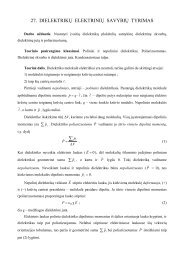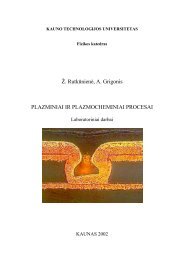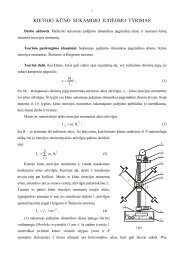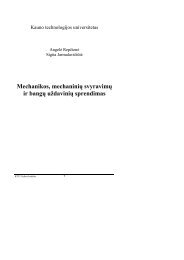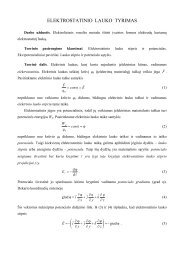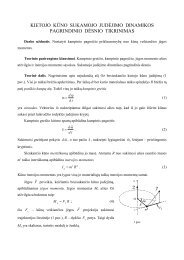PROCEEDINGS OF THE 7 INTERNATIONAL ... - Fizika
PROCEEDINGS OF THE 7 INTERNATIONAL ... - Fizika
PROCEEDINGS OF THE 7 INTERNATIONAL ... - Fizika
Create successful ePaper yourself
Turn your PDF publications into a flip-book with our unique Google optimized e-Paper software.
MEDICAL PHYSICS IN <strong>THE</strong> BALTIC STATES 7 (2009)<br />
Proceedings of International Conference “Medical Physics 2009”<br />
8 - 10 October 2009, Kaunas, Lithuania<br />
EDUCATION <strong>OF</strong> MEDICAL PHYSICISTS IN LITHUANIA<br />
Diana ADLIENĖ*, Violeta KARENAUSKAITĖ**, Ričardas ROTOMSKIS***<br />
*Kaunas University of Technology; **Vilnius University, Physics Faculty; ***VU Institute of Oncology<br />
Abstract: This paper presents an overview of the education of medical physicists in Lithuania. The content and structure<br />
of the master’s programs at Kaunas University of Technology and Vilnius University are analyzed. The authors identify<br />
the problems encountered in the current context of education for medical physicists and explore opportunities and future<br />
directions for this profession.<br />
Keywords: medical physicists, education, master’s programs<br />
1. Introduction<br />
Medical physics is an important area where physics is at<br />
the service of society ensuring the safety of health care.<br />
In hospitals medical physicists are principally concerned<br />
with using their physics expertise to ensure the<br />
effective, safe, efficient and scientific use of medical<br />
devices. Compared with other health care professions,<br />
the profession Medical physicist (MP) is comparatively<br />
young and less known. There is a real shortage of<br />
representatives of this profession in European health<br />
care institutions [1].<br />
The European Federation of Organizations for Medical<br />
Physics (EFOMP) is the basic organization which<br />
harmonizes and promotes the medical physics<br />
profession and clinical and scientific progress in<br />
Europe, offering recommendations in questions of<br />
teaching program preparation and accreditation,<br />
preparing regulatory documents for the medical physics<br />
profession and promoting collaboration between<br />
teaching institutions. EFOMP considers medical<br />
physicists to be health care professionals and seeks to<br />
incorporate the medical physics profession into the list<br />
of professions regulated by EU directives ensuring the<br />
recognition of medical physics specialists in all EU<br />
states [2, 3]. It has specified the ‘core tasks’ to be<br />
carried out by medical physicists within the different<br />
specialities. In 2008, the EFOMP Council set in motion<br />
the ‘Tuning Educational Structures in Europe’ process<br />
for master’s programs in medical physics, situated<br />
within the framework of the Bologna agreement. For<br />
medical physics two fundamental ‘points of reference’<br />
are the sets of outcome learning competences for<br />
master’s programs in medical physics and for the end of<br />
the two-year clinical training period mandated by<br />
EFOMP for the Qualified Medical Physicist (QMP) [4].<br />
The first stage in training a medical physicist is to bring<br />
the student up to a basic standard during an initial<br />
period of training at the university in physics,<br />
mathematics and other relevant topics in the natural<br />
sciences. The second is to introduce medical physics<br />
109<br />
into post-graduate education and the third is in-service<br />
training in hospitals. Once this program completed, the<br />
physicist can be recognized as a Qualified Medical<br />
Physicist (Fig.1).<br />
Fig. 1. EFOMP recommendations on the training of medical<br />
physicists [5]<br />
A Qualified Medical Physicist is an individual<br />
competent to practice independently and to register as a<br />
Medical Physicist in one or more of the subfields of<br />
medical physics e.g. therapeutic radiological physics,<br />
diagnostic radiological physics, medical nuclear<br />
physics, radiation protection physics or one of the many<br />
branches of medical physics that does not involve the<br />
use of ionizing radiation [3, 6].<br />
A Medical Physics Expert requires further experience<br />
and preferably involvement in a program for Continuing<br />
Professional Development. He (she) is an expert in<br />
radiation physics or radiation technology applied to<br />
exposure, whose training and competence to act is<br />
recognized by the competent authorities, and who, as<br />
appropriate, acts or gives advice on patient dosimetry,<br />
on the development and use of complex techniques and<br />
equipment, on optimization, on quality assurance,<br />
including quality control, and on other matters relating



